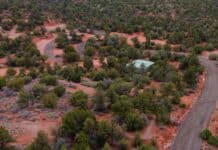
Recognition didn’t motivate Heather Risk to become north central Arizona’s only female golf pro this fall.
“I used to do special needs respite and rehabilitation for the state for many years, but I haven’t done that since I got into golf,” said Risk, director of instruction and head golf pro at Oakcreek Country Club after nine years at the Sedona Golf Resort, where she became a Class A member of the Ladies Professional Golf Association. “It’s a full-time job now.
“I think families, if they have a special needs kid, have a hard time in dealing with their differences and maybe not their accomplishments they’re going to have. But having someone in your family that has special needs is a huge blessing. You learn a whole lot more. It’s an awesome experience.”
Risk, 45, learned a lot from her little sister, Mary Beth, along with more than 20 foster siblings with special needs, to become involved with the Special Olympics in 1980, soon after her little sister was born with Down syndrome.
“She was just the coolest thing ever,” Risk said of Mary Beth, who died of leukemia at age 11 in 1990. “She was a swimmer. I took her to Special Olympic meets and practices, volunteered in high school for a Special Olympics class, things like that.
“She was the reason. She taught me, more than anything else, just [about] unconditional love. She didn’t care who you were, or what you did for a living. She was just happy to be around people — loved Special Olympics, loved video games and Arby’s.”
In Mary Beth’s memory, Heather Risk has carried on support for local Special Olympics golfers ever since, coaching Special Olympics golf and softball teams.
“I have a couple groups that come out and practice Saturdays here, during the golf season, for Special Olympics,” she said. “The Verde Valley — Sedona, Cottonwood, Camp Verde — has 60-some-odd athletes who do golf.”
On Nov. 16, Risk partnered with Terri Schock, 58, to shoot four strokes under her age and take home a gold medal, by 11 strokes, from the Arizona state Special Olympics in a nine-hole alternate-shot golf tournament.
“Terri tees off on all the odd holes; I tee off on all the evens,” Risk said. “Then I hit a shot [and] she hits a shot. Before you go to State, you give your scores, so you’re paired, in groups of three, with like people.”
This was after Risk and Schock, who lives with her similarly brain-damaged sister at a Camp Verde assisted living facility, had “a ton of fun” in Ireland at the 2003 World Games.
“Special Olympics has athletes who just do skills,” Risk said. “Just do chipping, putting, hitting the driving range. Then we have some athletes that play nine [or] 18 holes on their own.”
On Dec. 6, Risk and 30-year-old Ian Rezabek, who also has Down syndrome and lives with his “awesome” parents, start tour play in Special Olympics golf tournaments in Sun City as partner and athlete.
“He’s pretty high-functioning, but he wouldn’t be able to live on his own,“ she said. “We play on a traveling tour once a month through June [at] different golf courses down in Phoenix, then we come up here in March and play probably 20 twosomes in Prescott. Every month you get points and every year they give out awards.”
Starting in July, Risk’s Special Olympics softball team plays in an area original tournament one Sunday each month locally, in Camp Verde or in Flagstaff.
“They go practice every Friday,” she said. “I can’t quite go all the time, because of work.”
Regardless, Risk, who has been teaching and coaching softball and golf to Special Olympics athletes “since I can remember,” feels she gets much more out of the experience than the athletes probably do.
“What’s really cool about Special Olympics is, they don’t care how you hit a shot,” she said. “It doesn’t matter.
“What’s special is being out there, being able to hit a golf ball — the experience.”
When she is not doing that, or refereeing high school basketball and volleyball games, Risk helps as many as 15 students at weekly clinics on the country club driving range with course management skills as well as putting, bunkers, uneven lies, pre-shot routine — “everything,” she said.
Slinging hula hoops over her shoulder, off the back of her golf cart, she uses them as balance aids, targets and “a good visual,” among other purposes, to help golfers straighten the diagonal angle of their downswings.
“Giving lessons to our members and our public, I love to see the happiness,” she said. “They hit a good shot, and they’re happy: ‘Oh, my gosh, I’ve got to do that again.’
“That’s why I do what I do.”


















